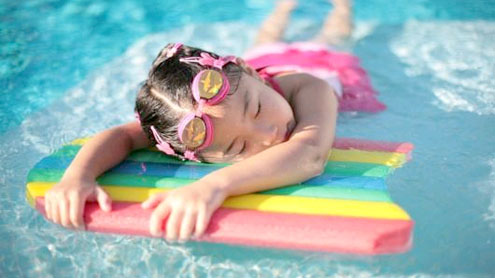 Competitive swimmers who train at indoor chlorinated swimming pools may have lung changes similar to those seen in people with mild asthma, according to an international study, although there is no evidence those changes lead to actual asthma.
Competitive swimmers who train at indoor chlorinated swimming pools may have lung changes similar to those seen in people with mild asthma, according to an international study, although there is no evidence those changes lead to actual asthma.
To obtain findings published in the Journal of Allergy and Clinical Immunology, researchers from France and Canada compared lung tissue and breathing tests from 23 elite Canadian swimmers, whose average age was 21, to 10 mild asthmatics and 10 healthy people without allergies of the same age. The team, led by Valerie Bougault at the Lille 2 University of Health and Law in France, found that tissue samples from swimmers’ lungs had nearly six times as many immune cells associated with asthma and allergies as the lung tissue of healthy subjects, a similar amount to what was found in the group with mild asthma.
“Intense, long-term swimming training in indoor chlorinated swimming pools is associated with airway changes similar to those seen in mild asthma,” wrote Bougault.Swimmers and asthmatics also showed evidence of scar tissue in the lungs, while healthy non-swimmers did not.“This study is the first to show direct evidence of airway damage associated with swimming in chlorinated pools,” said Alfred Bernard, a toxicologist at the Catholic University of Louvain in Brussels, Belgium, in an email to Reuters Health. Bernard was not involved in the study.
Tissue samples and tests were taken during the off-season when the swimmers were not competing.Lung tissue inflammation was not associated with actual asthma symptoms, such as coughing and wheezing, or with difficulty breathing during a medical test used to determine lung function.While acting as a disinfectant, chlorine reacts with a wide range of chemicals from human sweat, urine and hair, for example, to form chlorine byproducts, some of which are hazardous to human health. These byproducts are very volatile and can escape into the air above the water.Competitive swimmers are known to inhale large amounts of these chlorine byproducts while doing strenuous exercise in the pool, and exposure to the chlorine compounds in indoor pools may make swimmers more sensitive to other allergens such as pet dander, pollen and dust, wrote Bernard.
Indeed, roughly 50 to 65 percent of competitive swimmers are sensitized to common allergens, compared with 29 to 36 percent of people in the general population, he added.But it was not clear if exposure to the chemicals caused the lung tissue damage. A study of elite cross-country skiers showed that the stress placed on lungs during high-level endurance sport training itself might be enough to induce airway changes.“There’s currently no evidence to suggest that these changes will lead to asthma down the line,” said Sally Wenzel, a pulmonologist at the University of Pittsburgh, adding that it was likely the benefits of exercise outweigh potential risks. – Kahleejnews












